I am a huge fan of the Plutus Awards.
I think it’s amazing that the personal finance community organized an awards ceremony for their top content creators. (And I may be slightly obsessed about someday getting nominated for a Plutus Award.)
But I’ve always been curious about what it takes to create Plutus Award nominated content. What is it that sets these creators apart?
So I thought I’d ask them.
And it turns out it was as simple as that. When the finalists were announced, I sent emails to each of the finalists and asked them if they’d take a 2-minute survey about their blogging habits. Surprisingly, I got 38 responses, which is nearly everyone that I contacted that produces any type of written content.
The finalists were so generous in sharing their habits and advice for aspiring content creators.
If you’re looking for inspiration, here are how some of the top bloggers/creators do it.
Table of contents
- About the survey
- Most Plutus Awards finalists have been creating content for less than 6 years
- Nearly all Plutus Awards finalists have a publishing schedule
- Most Plutus finalists spend less than 4 hours on a blog post*
- Almost all Plutus Awards finalists write from the heart
- Most Plutus Award finalists write regularly
- And they have lots of writing habits
- More than half of Plutus Award finalists do everything themselves!
- Many Plutus Finalists don’t use paid tools
- Plutus Award finalists get traffic from a variety of different sources
- What does an average blog post look like for a Plutus Awards finalist?
- Advice from Plutus Finalists
- Summary
Please do not confuse my personal blog for financial advice, tax advice or an official position of the U.S. Government. This post may contain affiliate links. If you make a purchase after clicking on a link, I get a small percentage of the sale at no additional cost to you.
About the survey
I’ll admit that I’m obsessed with data. I’ve been doing research for 20 years and there’s nothing I love better than collecting some raw data and spinning some stories writing a peer reviewed journal paper on the topic.
I am also a huge fan of Andy Crestodina’s annual blog survey. Honestly, I feel like it’s a must read for any content creator. His data on what successful bloggers do has markedly influenced what I do on my own blog.
How could I pass an opportunity to collect original data on a very specific set of bloggers and publish the results?
Before diving in, I wanted to mention a few disclaimers:
- I am not affiliated with the Plutus Awards and reached out to the finalists on my own. I cannot speak to the Plutus Awards selection criteria or committee decisions.
- This is supposed to be a fun survey. I allowed anyone to skip questions or answer anonymously.
- I tried really hard to be as inclusive as possible and contact everyone I could. The survey is heavily tilted towards blogging but I reached out to multi-channel creators as well. If you think you should have been contacted but weren’t, I’m sorry. I tried hard, including Tweeting @ people who didn’t have functional contact forms on their site.
Most Plutus Awards finalists have been creating content for less than 6 years
The first question I thought I’d ask is how long the finalists have been creating content.
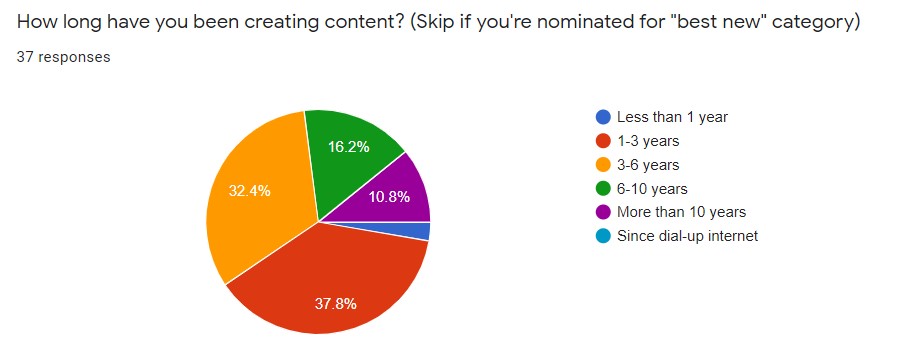
Over 2/3rds of the respondents have been at their craft for more than 6 years. (I specifically instructed “Best New” finalists to skip the question unless they were also nominated for a second award).
I’m a little disappointed that no one selected “since dial-up internet”. Yes. It was a hyperbole. But some of my favorite finalists, like Jim Wang have been creating content since what seems like dial-up internet.
Nearly all Plutus Awards finalists have a publishing schedule
Another question I was curious about was whether most finalists had a regular publishing schedule. My a priori hypothesis was that Plutus Award winners took their blogs seriously and published on a regular schedule.
The data support my hypothesis; less than 20% of finalists only publish when they feel like it.
But beyond having a regular schedule, there is a lot of diversity in how often Plutus Award finalists publish content.
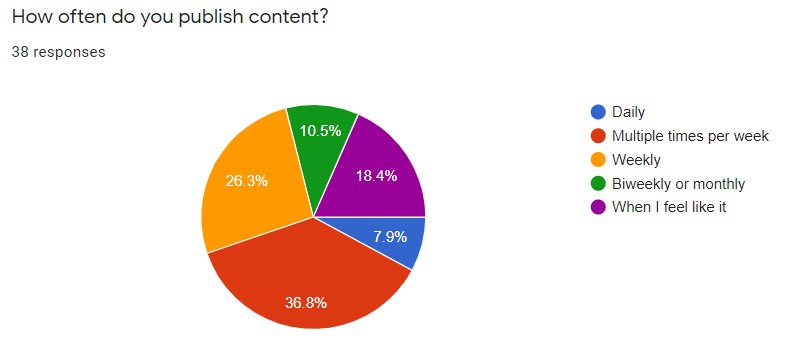
Most Plutus finalists spend less than 4 hours on a blog post*
*I messed this question up.
As someone that conducts physical science research, I forgot how messy it was collecting data on humans.
I asked how long it takes to write a blog post. But I failed to define what I meant by “write a blog post”. This became clear once the answers started popping up in the “other” box.
For example, when I write a blog post, I might spend 30-45 minutes doing keyword research, 15-30 minutes trying out different H1 tags, 30-90 minutes creating graphics and then sit down and write the actual blog post in 2 hours or less.
So did I write that blog post in 2 hours? Or 4 hours?
Despite the fact that I didn’t define what I was asking for in this question at all, everyone answered it.
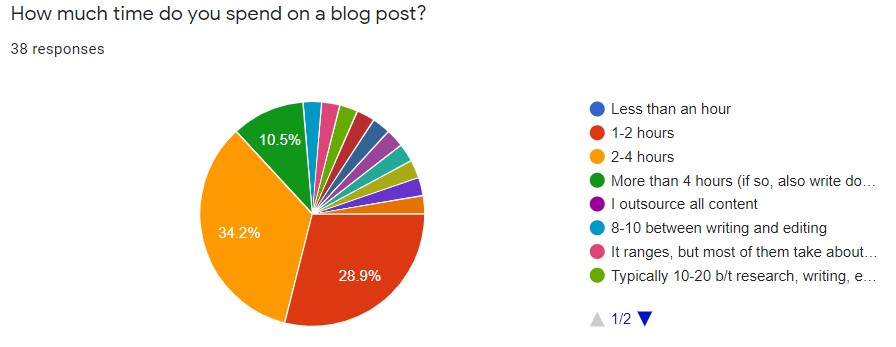
It looks like almost 2/3rds of respondents write their blog posts in less than 4 hours. Again, I have no idea if they meant 4 hours of writing or if they included research in that time.
For what it’s worth, Andy Crestodina says that the average blog post takes 3 hours and 55 minutes to write (but he is also very vague about what that means).
Almost all Plutus Awards finalists write from the heart

This was one of my favorite questions. I thought it was super interesting to see how Plutus Award finalists chose their content topics. Nearly all of them wrote about topics they wanted to write about.
I also added an “other” block. However, most of the responses in “other” could be either described as competitor research or “what I feel like writing about”.
There was one exception though. One finalist chooses topics that, “intentionally leads up to my products, launches, or other projects“. I thought this was an excellent strategy for producing content and really regretted leaving it off the survey because I’m sure others do it as well.
Most Plutus Award finalists write regularly
In addition to data, I’m obsessed with writing habits. Someone forced me to read Professors as Writers: A Self-Help Guide to Productive Writing as a graduate student and it completely changed my career trajectory.
While many of my coworkers barely meet our minimum requirement of 3 peer reviewed papers per year, I frequently belch out more than 10. Which I attribute to writing habits I put together from that book. (I also borrow heavily from Ernest Hemingway’s writing habits).
Since the Plutus Awards recognizes excellence in personal finance writing, it’s not surprising that many of these writers write on a schedule.
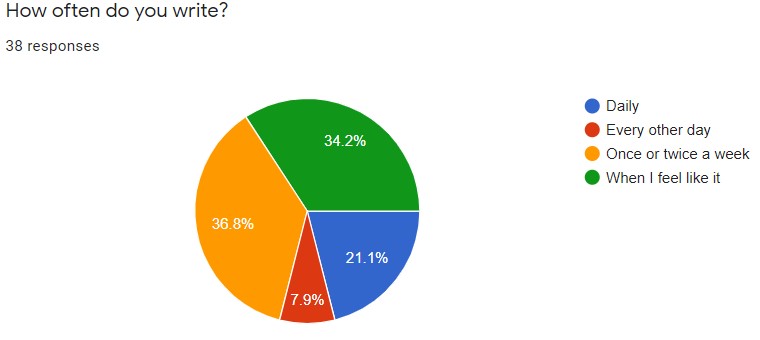
Nearly 2/3rds of the finalists have a specific writing schedule and only 1/3 write when they feel like it.
And they have lots of writing habits
I followed up the question on writing frequency with writing habits. Only 35% of the finalists did not have any writing habits. Here are some of my favorite responses to the question. (Some serious, some less so)
After researching then outlining my post and answering the main question, I write for 45 minutes, break for 15, then write for 45 minutes again
I write when I’m at work and it’s slow 😉
Research extensively, then outline, then add in the poop jokes.
I get up every morning at 6 am and write for 2 hours before starting my day job
I always create outlines. It organizes my content and let’s me know what I need to cover for an article. I usually write my intro and conclusion last to summarize the key points throughout.
Once I create my outline and have done my research, I like to blast the music loud and pour a glass of wine and start writing.
I think it is just important to start writing. Don’t wait for inspiration to “hit” you, start writing and inspiration will pour out of you!
I like to use pomodoro – essentially setting a 20 min timer then taking a short 5 min break and repeat a couple of times before a longer break.
More than half of Plutus Award finalists do everything themselves!
Beyond writing habits, I was also curious how Plutus finalists approached content creation. I remember listening to a ChooseFI podcast where the interviewee said that he quit is day job and basically “ran some big-name blogs” behind the scenes. (I don’t remember the episode number but I can tell you I was in the car with my wife when we were driving through Kaukauna, WI on the way back from vacation while our kids slept in the back of the car.
Anyway, after listening to that episode, I became super curious about how involved the “face of the blog” was in the actual blog for nearly every blog I know about.
It turns out that more than half of Plutus Awards finalists do everything themselves. And the other half only hire out limited amounts of help.
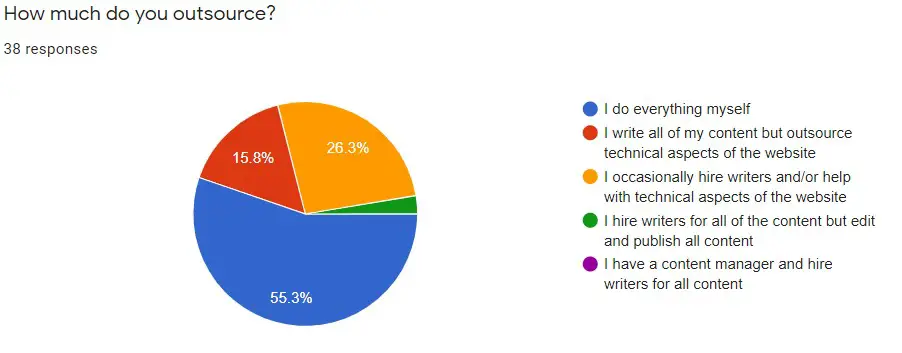
Many Plutus Finalists don’t use paid tools
I’ll be honest, I was looking for a competitive edge when asking this question.
When I started blogging, I tried to not spend any money blogging (and as a result had little-to-no traffic). It was only when I invested in Keysearch, that my blog traffic started to grow. (In fact it shot up by 600% in less than a year).
Once I learned that using tools could lead to such dramatic increases in traffic, I became obsessed with finding the next greatest tool that could increase my traffic by another order of magnitude.
While I was looking for some secret sauce (Is everyone else secretly using Jarvis to pump out mountains of content?) It turns out most people don’t use any paid tools.
More than half (at least 20/38ths) stated they didn’t use any paid tools. But the data here was messy since I didn’t really define what “tools” meant.
(For instance, if you run a course on Teachable or Podia, is that a paid tool? It’s not really part of how you create content but rather how you sell it).
Of the people that did use tools, the most popular was Ahrefs (no surprise) but only 13% of people use it. Other popular tools were Ahrefs alternatives Keywords Everywhere (8%), SemRush (3%), and Keysearch (3%).
Beyond SEO tools, Canva was the top used tool with at least 8% of Plutus Finalists reporting that they use it.
While the answers to this question were all over the board, I think I can safely say that using a secret tool is not they key to becoming a 2022 Plutus Awards finalist.
Plutus Award finalists get traffic from a variety of different sources
I was also curious about the different ways that different Plutus Award finalists built their audiences. While it is no surprise that organic traffic was the biggest traffic source for a lot of blogs, others got significant amounts of traffic from Pinterest, social media (excluding Pinterest), and email subscribers.
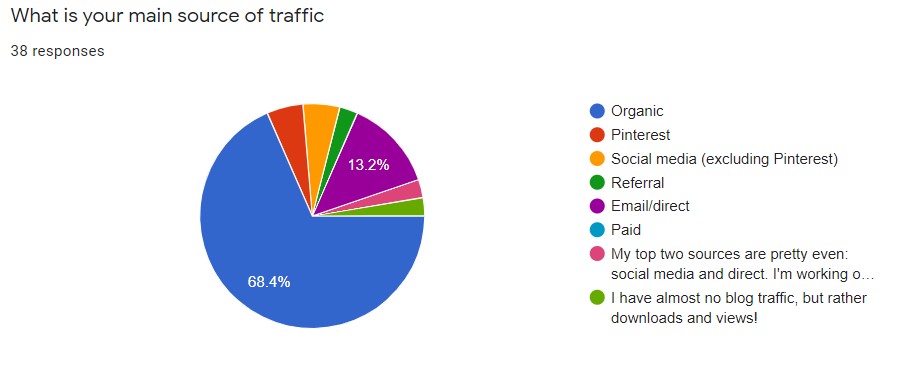
What does an average blog post look like for a Plutus Awards finalist?
To round out my technical questions, I was curious to compare the blog benchmarks between Plutus Awards finalists and the Orbit Media Solutions blog report.
The average Plutus Awards finalist only tries out one heading for their blog post and updates old content. Additionally, most posts were between 1,000 and 2,000 words.
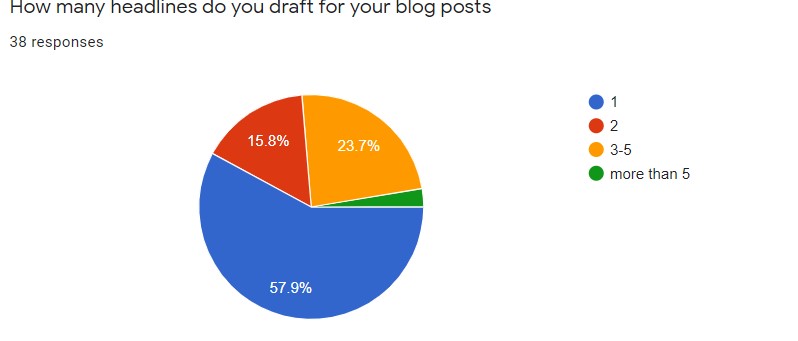
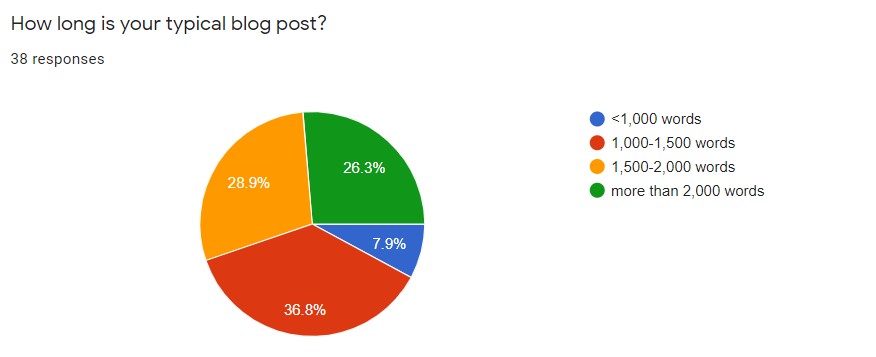
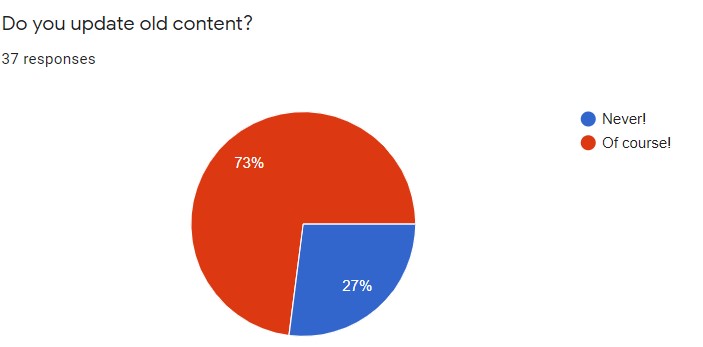
For what its worth, the blogging statistics survey suggests that creators who write 7+ headlines per post, write content more than 2,000 words per post, and update old content have the most success. However, I enjoyed learning about the diversity in content strategies across the Plutus Awards finalists.
Advice from Plutus Finalists
Okay. This is actually the best part of this post. I asked the finalists what advice they’d give to a personal finance blogger. The results were spectacular!
Here are some of the best pieces of advice I received. (I wish I could publish them all but the advice totaled over 1,000 words and I can barely *read* an 1,800 word blog post, let alone write one that long 🙃)
Just start writing. Start writing about what interests you, and stop worrying about what others might think. Most of our writing is much less extraordinary than we hope, and most others care about our writing style much less often than we fear. What isn’t normal is putting your writing out there for the whole world to see. That’s the magic.
Do whatever you have to do to keep yourself in the game. Whether it’s celebrating small wins (a link from a bigger blog, a nomination, a RT, whatever) or knowing you need to take a break (and taking one, so you don’t burn out!), you want to stay in the blogging game as long as you can because eventually you’ll have a breakthrough. You can only learn by doing and you just have to find ways to keep doing the work.
Don’t be afraid to invest in your site if you know what you’re doing and have a vision.
You have to be interested in what you write about. It requires enthusiasm to stick to your craft and to attract people to want to read it.
Consistency over time – it gets results and you also get better as a result.
You don’t have to know everything right now. People want to learn and learn WITH you. Your perspective and voice is what draws them in. Be yourself and be open to learning with your audience as you go.
If you want your blog to be a business, run it like a business and create your funnel. Traffic and social media followers mean nothing unless unless you’ve created an income stream.
Summary
I really enjoyed doing this survey. I hope you all learned something about these awesome content creators that comprise the 2021 Plutus Awards finalists class.
Thank you to all who responded. I gave the people the option of responding anonymously, but wanted to give credit to the following people who were brave enough to sign their survey:

